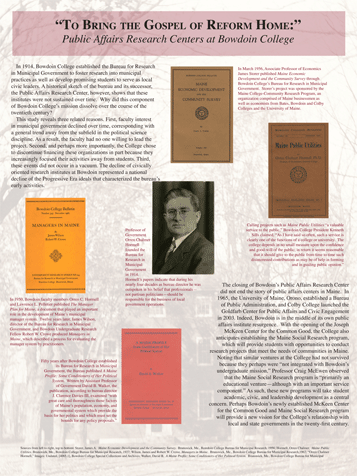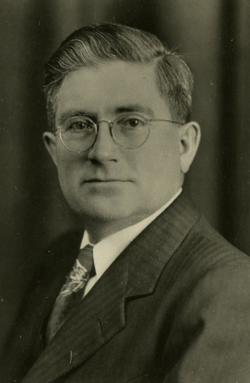"To Bring the Gospel of Reform Home:" Public Affairs Research Centers at Bowdoin College

A historical sketch of the Bureau and its successor, the Public Affairs Research Center, however, shows that these institutes were not sustained over time. Why did this component of Bowdoin College's mission dissolve over the course of the twentieth century?
This study reveals three related reasons. First, faculty interest in municipal government declined over time, corresponding with a general trend away from the subfield in the political science discipline. As a result, the faculty had no one willing to lead the project. Second, and perhaps more importantly, the College chose to discontinue financing these organizations in part because they increasingly focused their activities away from students. Third, these events did not occur in a vacuum. The decline of civically oriented research institutes at Bowdoin represented a national decline of the Progressive Era ideals that characterized the Bureau's early activities.

Professor of Government Orren Chalmer Hormell founded the Bureau for Research in Municipal Government in 1914. Hormell's papers indicate that during his nearly four decades as bureau director he was outspoken in his belief that professionals - not partisan politicians - should be responsible for the business of local government operations.




Fifty years after Bowdoin College established its Bureau for Research in Municipal Government, the Bureau published A Maine Profile: Some Conditioners of Her Political System. Written by Assistant Professor of Government David B. Walker, the publication, according to bureau director, J. Clarence Davies III, examined "with great care and thoroughness those factors of Maine's population, economy, and governmental system which provide the basis for her politics and which must set the bounds for any policy proposals."
March 1956, Associate Professor of Economics James Storer published Maine Economic Development and the Community Survey through Bowdoin College’s Bureau for Research in Municipal Government. Storer’s project was sponsored by the Maine College-Community Research Program, an organization comprised of Maine businessmen as well as economists from Bates, Bowdoin and Colby Colleges and the University of Maine.
Calling projects such as Maine Public Utilities "a valuable service to the public," Bowdoin College President Kenneth Sills claimed, "As I have said so often, such a service is clearly one of the functions of a college or university The college depends in no small measure upon the confidence and good-will of the public; in return it seems reasonable that it should give to the public from time to time such disinterested contributions as may be of help in forming and in guiding opinion."
Story by Bobby Guerette, '07
Sources: Storer, James A. Maine Economic Development and the Community Survey. Brunswick, Me., Bowdoin College Bureau for Municipal Research, 1956; Hormell, Orren Chalmer. Maine Public Utilities. Brunswick, Me., Bowdoin College Bureau for Municipal Research, 1927; Wilson, James and Robert W. Crowe. Managers in Maine. Brunswick, Me., Bowdoin College Bureau for Municipal Research,1962; “Orren Chalmer Hormell,” Images: Undated, [4065.1], Bowdoin College Special Collections and Archives; Walker, David B. A Maine Profile: Some Conditioners of Her Political System. Brunswick, Me., Bowdoin College Bureau for Municipal Research.